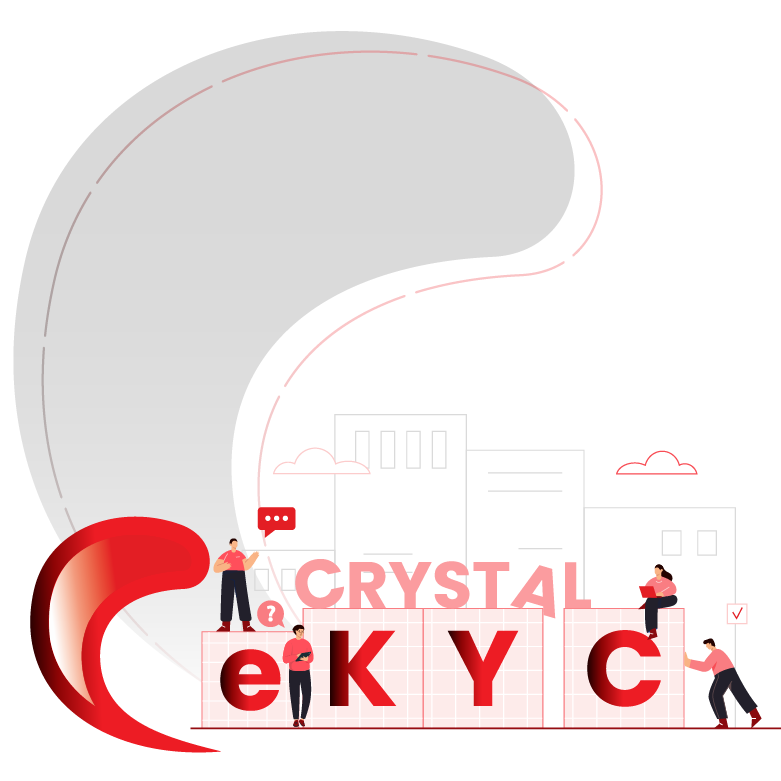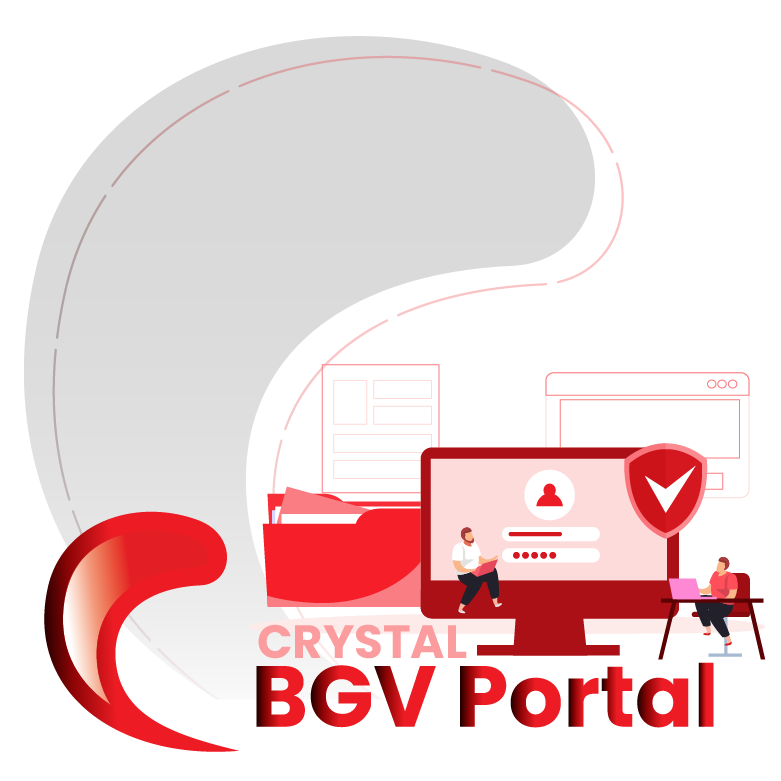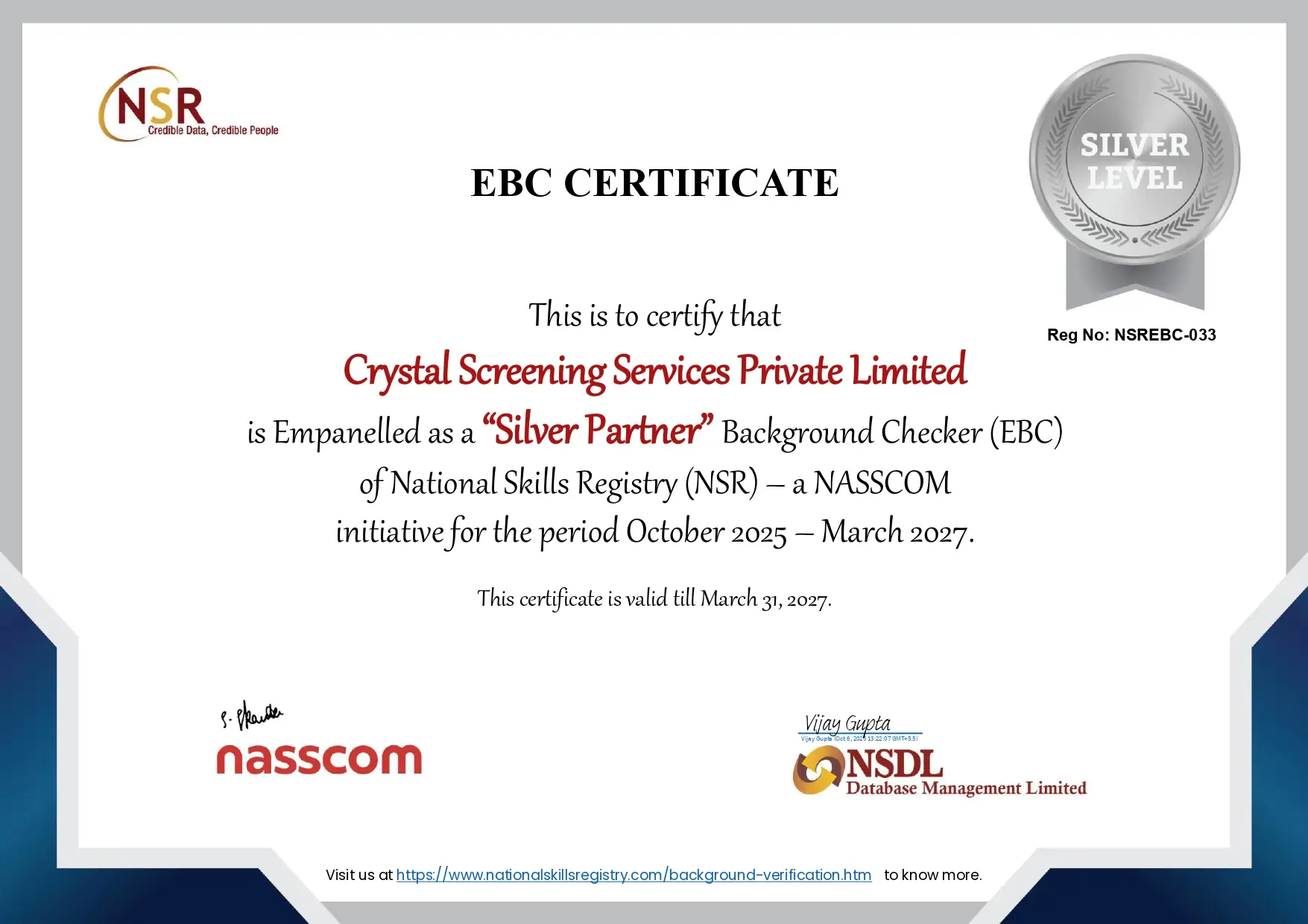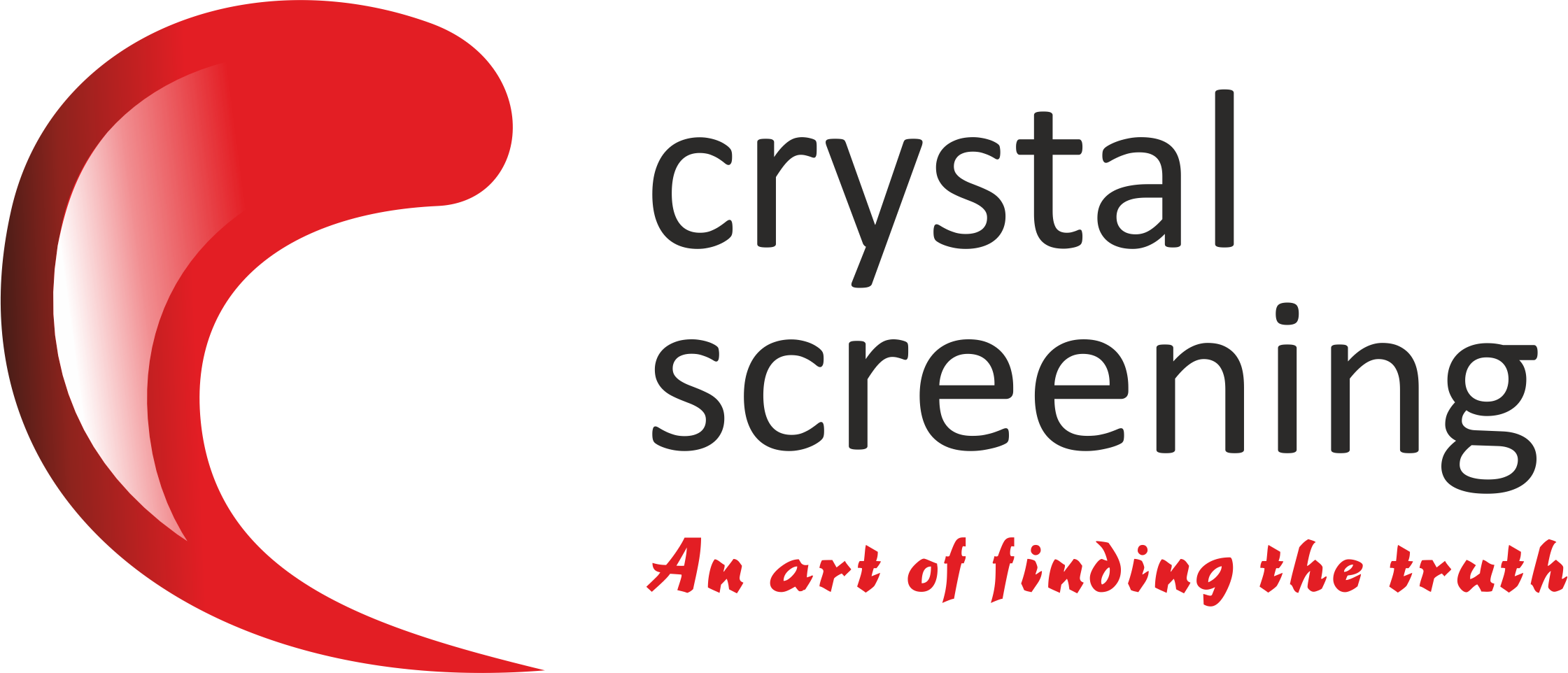
Digital Verification & Virtual Onboarding
Cutting-edge authentication products and alternate data analysis for your business. Building and trust through data.
We Are Certified by
Empaneled by the National Skills Registry (NSR) — a NASSCOM initiative — to conduct background verification (BGV)



Authenticate Documents and Employees On-boarding

Pre/ Post Employee Verification Services

Real time verification


Digital KYC Solutions via software portal

Moonlighting
Our products are designed for smooth real-time verifications

Crystal eKYC
We have developed an online software with API Integration from respective government authorities to access to real-time information for BGV checks like Aadhar, PAN Card, Voter ID, Driving License and UAN verification. These APIs allow us to fetch the required information securely.
Crystal BGV Portal

CRYSTA AccessDIGI
Your content goes here. Edit or remove this text inline or in the module Content settings.Your content goes here. Edit or remove this text inline or in the module Content settings.Your content goes here. Edit or remove this text inline or in the module Content settings.
How it works – 3 easy steps
Step 01
To start the BGV process, Candidates receive an Email from Employer or Crystal Screening to complete the document submission process through a BGV form and upload the necessary documents. Candidate will also signed consent form for verification.

Step 01
To start the BGV process, Candidates receive an Email from Employer or Crystal Screening to complete the document submission process through a BGV form and upload the necessary documents. Candidate will also signed consent form for verification.


Step 02
Update all the information and documents then select the checks you want to conduct like Residence, Education, ID, Employment, etc. And HR will perform the quality check and approve once it is received.
Step 02
Update all the information and documents then select the checks you want to conduct like Residence, Education, ID, Employment, etc. And HR will perform the quality check and approve once it is received.
Step 03
The cases provided to CRYSTAL can be tracked and followed-up through the HR Dashboard on real time basis.

Step 03
The cases provided to CRYSTAL can be tracked and followed-up through the HR Dashboard on real time basis.
Faq – Frequently Asked Questions
Why is Employee Moonlighting/ Dual Employment Check Important?
Employers give substantial resources to recruiting, hiring, and training their employees. Consequently, they expect their employees to be loyal to their primary job and give their best effort to help the company achieve its goals. But, employees who work multiple jobs may not be able to fulfill their commitments to their primary employer. This can lead to dwindled the productivity, missed deadlines, and deprived job performance. Moreover, employees engaged in multiple jobs may use company time, resources, and copyrighted information to promote their secondary job or business. By verifying whether an employee is working for another company, running their own business, or self-employed, employers can detect and inhibit any clashes of interest.
How does digital address verification happen?
In digital verification a link is share you with on SMS and Email which you need to complete from the address that you are verifying. It will capture the geolocation and the nearest landmark. You will also need to be ready with the address proof and for a selfie.
Which Laws regulate employment background verification?
Employers must follow the guidelines provided by FCRA (Fair Credit Reporting Act), State Consumer Reporting laws, and enforcement guidance by U.S. Equal Opportunity Commission 2012. Following these guidelines is necessary while conducting employment screening and preparing employee background verification questions.
How long does an employment background check take?
It depends on the number and type of checks the employer wishes to conduct. Regular screening may take two to seven days, depending on the candidate’s history and the post offered. Some pre-employment background checks may take 2 to 4 weeks. If the screening involves international candidates, it may take more time depending on the rules of the concerned countries.
What Causes a Failed Background Check?
Employers conduct various background checks like education verification for employment, previous employment history checks, verify credit history, criminal record checks, driving records and pre-employment drug test screenings. Any discrepancies such as fake licenses, criminal history, and incorrect credentials lead to a failed background check.
What should I do if a candidate fails background verification?
If an employee fails the background verification, they may be terminated and put on the No-Hire list, which means they can never get a job in that organization. In addition, if you have applied for a job and fail background screening, the employer will disqualify your application without notification.
How far back do background checks go?
In general, employers follow a 7-year-rule, which means they can check criminal history and other compliance issues for seven years. However, depending on the need and local state guidelines, this rule can be skipped. For example, In California, if the salary is above $125,000. Then, employers can go back up to 10 years for background checks.
If an applicant is new to this country or here on a work visa, are we obligated to conduct a background investigation in their home country?
No, you are not obligated to conduct an investigation in a foreign country, which can often prove impractical or cost-prohibitive. One alternative is to request a prospective employee’s visa file under the Federal Freedom of Information ACT, which often contains a fair amount of background information.
Can we deny a candidate a position based solely on a poor credit record?
The answer to this question may vary from state to state and from position to position. While some states allow the use of credit records as part of the screening process, other states have limited the use of credit to only positions where the applicant will be placed in a position of financial responsibility within the hiring company.
For those states that do allow the use of credit records, there is no express prohibition against denying an applicant based solely on a credit record, but the use of credit records alone has been challenged on the grounds that it is used as a proxy for other, clear discriminatory bases, such as race or sex. Federal law prohibits employers from discriminating against employees because they have filed for bankruptcy protection. Great caution should be taken when considering this category of information; the benefit of a complete background check is that it provides a multi-faceted picture of the applicant, allowing the employers to make a decision based on the entire record, not just one aspect of it.
What do we do if the candidate insists that the information contained in the background report is not accurate?
If the candidate is denied employment due solely to the negative background check, the candidate should be given an opportunity to dispute the information and prove that it is incorrect. Typically, the candidate will dispute the information with a credit reporting agency or other source of the allegedly bad information
How many years do criminal records go back?
Each state, county and city is different. Some courthouses choose to only maintain seven years of records, some hold on to cases for ten years and others have no time limit to age of their records. Arrest records are often maintained the same way. Whereas one state may keep arrest and conviction data for seven years, some for ten and others have records that go as far back as they have been recording them.Unfortunately, there is no set rule, but seven to ten years is most common.
Empaneled by the National Skills Registry (NSR) — a NASSCOM initiative — to conduct background verification (BGV)



